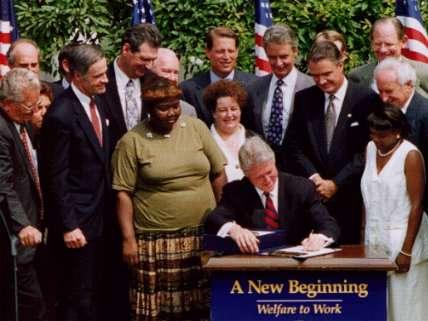Welfare Reform Paved Trail For Obamacare Repeal
Not only can entitlement programs be rolled back, but politicians who do it can even get re-elected.

How thoroughly has the Washington press corps forgotten the lesson of Bill Clinton's 1996 welfare reform? Thoroughly enough that at the top of its front page on May 8, The New York Times reported that the Republicans overhauling Obamacare "have been largely silent about one of the most remarkable aspects of what their legislation would do: take a step toward dismantling a vast government entitlement program, something that has never been accomplished in the modern era."
A smart editor once told me to be careful before typing the word never.
In this instance, the Times reporter, Jeremy W. Peters, might have checked his own newspaper's online archive. The August 23, 1996, Times front page reported, "In a sweeping reversal of Federal policy, President Clinton today ended six decades of guaranteed help to the nation's poorest children… With his signature, at a Rose Garden ceremony, the President eliminated a pillar of Franklin D. Roosevelt's New Deal social welfare program."
Maybe to Peters, who graduated from the University of Michigan in 2002, 1996 doesn't qualify as the "modern era." Or maybe he or his editors at the Times are taking a post-modern approach to journalistic accuracy. But to a pre-modern fellow such as myself, who actually was in Washington in 1996 covering the welfare-reform story as it was happening, this is all worth remembering now, because the story is precisely relevant to today's political and policy debates over the possible rollback of Obamacare.
The alarmism is pretty much the same.
Back in the mid-1990s, Sen. Edward Kennedy (D-Massachusetts) described the welfare reform legislation as "child abuse." Sen. Daniel Patrick Moynihan (D-Oklahoma) called it "the most brutal act of social policy since Reconstruction."
Peter Edelman, a Clinton administration staffer who resigned to protest the welfare reform law, wrote in The Atlantic that it would "move 2.6 million people, including 1.1 million children, into poverty…. There will be more malnutrition and more crime, increased infant mortality, and increased drug and alcohol abuse. There will be increased family violence and abuse against children and women." In fact, infant mortality, crime, and domestic violence all declined.
The president of the Children's Defense Fund, Marian Wright Edelman, called the welfare reform bills "fatally flawed, callous, anti-child assaults." She said the bills "eviscerate the moral compact between the nation and its children and its poor."
The warnings from 20 years ago against throwing poor mothers and children off welfare and into the streets all sound a lot like today's warning against throwing Americans off their subsidized health insurance. In both cases, the flawed assumption is that once a federal program is ended, the people who were benefiting from it will be unable to come up with another way to meet their unfilled needs.
In the case of welfare reform, that assumption proved inaccurate. Many welfare recipients—tens of millions of them—started supporting themselves by working at paid jobs. Others relied on private charity, friends and family, or other government programs, such as disability, instead of the old "Aid to Families With Dependent Children," which became "Temporary Assistance to Needy Families."
Some mix of government and market-based solutions will no doubt similarly rise to meet the needs of those who had been receiving health insurance coverage via the Obamacare exchanges or Medicaid expansion.
Perhaps some doctors and hospitals will devote increased hours to charity care. Perhaps community health centers will bear more of the burden. Perhaps pressure will build to ease immigration restrictions on foreign-trained doctors.
Perhaps "medical tourism" will surge for Americans taking advantage of lower-cost procedures overseas. Perhaps insurers will offer lower prices for narrower networks of doctors, or experiment with offering coverage over 20 or 30 year time-spans, like life insurers, rather than over just one year at a time. Perhaps states and employers will solve these problems better than the federal government has. Perhaps some of the people now relying on Obamacare will take jobs that offer health insurance.
Beyond the alarmism and the possibility for outcomes that are better than the warned-of catastrophes, welfare reform and health care have in common some political characteristics. Both welfare recipients and people receiving health coverage via Obamacare exchanges and subsidies amount to a minority of voters, not a majority. After the 1996 welfare reform, both President Clinton and the Republicans who held majorities in the House and Senate in Congress won re-election.
In other words, not only can entitlement programs be rolled back, but politicians who do it can even get re-elected. If The New York Times thinks this "never" happens, it's just wrong.


Show Comments (23)